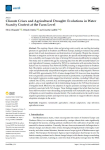Chiappini S., Cimino O., Cardillo C. (2025). Climate crises and agricultural drought: evolutions in water scarcity context at the farm level. Earth, 01/06/2025, vol. 6, n. 2, p. 56.
https://doi.org/10.3390/earth6020056
https://doi.org/10.3390/earth6020056
| Titre : | Climate crises and agricultural drought: evolutions in water scarcity context at the farm level (2025) |
| Auteurs : | S. Chiappini ; O. Cimino ; C. Cardillo |
| Type de document : | Article |
| Dans : | Earth (vol. 6, n. 2, June 2025) |
| Article en page(s) : | p. 56 |
| Langues : | Anglais |
| Langues du résumé : | Anglais |
| Catégories : |
Catégories principales 07 - ENVIRONNEMENT ; 7.6 - Changement ClimatiqueThésaurus IAMM CHANGEMENT CLIMATIQUE ; AGRICULTURE ; SECHERESSE ; EAU DISPONIBLE ; CULTURE IRRIGUEE ; ITALIE |
| Résumé : | The ongoing climate crisis and growing water scarcity are exerting increasing pressure on agriculture in Southern and Western Europe, leading to reduced crop yields, greater risk of land abandonment, and deterioration of soil quality. Despite the extensive literature on irrigation and water use in agriculture, the specific relationship between irrigation availability and changes in the type of farming (ToF) remains insufficiently investigated. This study aims to address this gap by analyzing data from the 2010 and 2020 Italian General Agricultural Censuses conducted by ISTAT, in combination with microdata from the Italian Farm Accountancy Data Network (FADN), focusing on irrigated farms in Southern Italy. Descriptive analysis reveals that over 60% of irrigated farms specialize in permanent crops and predominantly adopt efficient irrigation systems such as drip irrigation. Between 2010 and 2020, approximately 23.8% of farms changed their ToF; however, these transitions were not generally associated with improvements in productivity or profitability. Results from logistic regression models suggest that structural variables-including Utilized Agricultural Area (UAA), economic size, and demographic characteristics such as the farmer's gender-play a more significant role in determining changes in the ToF than the presence of irrigation itself. Moreover, the adoption of organic practices and larger farm sizes are positively associated with ToF changes. These findings suggest that while there has been some shift toward less water-demanding and potentially more sustainable crops, the impact of irrigation on such transitions remains limited. The results underscore the need for more targeted agricultural policies and improved data collection to support effective climate adaptation strategies in the sector. |
| Cote : | En ligne |
| URL / DOI : | https://doi.org/10.3390/earth6020056 |







